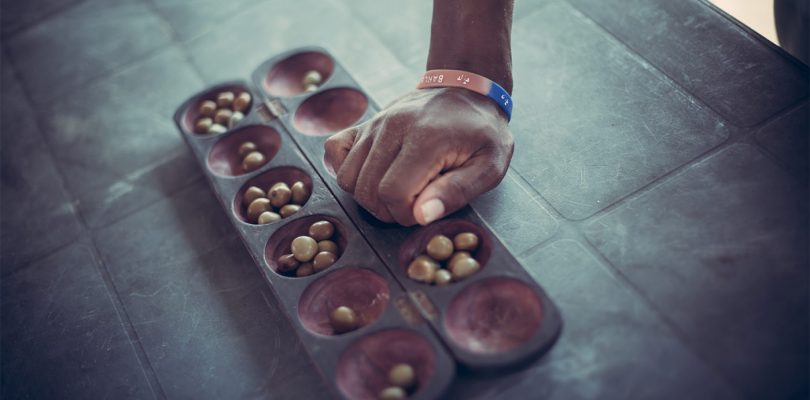The word Oware is derived from the language Twi, widely spoken by the Ashanti people; which simply means he/she is married. Interestingly enough, Oware is also referred to as a ‘Mancala’ game, which is a classification and a part of the various family board games played globally. Oware is also about ‘capturing and counting’. Mancala actually comes from the Arabic word naqala which means ‘move’.
Surprisingly and unknowingly to a lot of people, Oware (pit and pebbles game) is played mostly in South Asia and Africa because it is influenced by the culture of these two individual continents.
The game is played with different strategy, methods and variations across the globe, making it easy as ABC, a deck of cards or very complex with limitless options.
Oware also known in other African countries as Wari, Awale and many other names historically started way back in ancient Egypt between 10th and 15th century BC, then later during pre-slavery and precolonial times during and after the traffic of slaves from Africa to America, The Caribbean and beyond.
Back in the days, players passionately dug holes in the ground (as the pit) and used palm kernels (as marbles/pebbles). As interesting, arithmetic and educative as Oware was back in the days (and still is), the Kings, Queens and other royalties of the Ashanti Kingdom weren’t left out in the excitement of playing this game. Back then, the royals of the Ashanti Kingdom went as far as making sure they played the ‘Oware’ game on beautiful ivory boards embroidered with gold.
Although this game has been widely accepted in several western countries, take note that the ‘Oware’ game originally comes from the northern part of the ‘Gulf of Guinea’, and extended from there to the West Indies.

Oware Rules – How to Play Oware
The rules of the games are simple. Traditionally only two players can play Oware at a time. It is believed to be a never-ending game just like how marriage is seen to be a never-ending commitment.
The game requires patience and discipline among players. It is played on a board of 12 holes with exactly 48 pebbles which are generously distributed equally between both players.
The Oware board has 2 straight rows with 6 holes (called houses with two large houses on either end) where both players take turns to drop pebbles one by one into those consecutive holes.
Both players however, controls the six holes on his/her side of the board. Now the aim of the game is to actually capture 25 pebbles (by each taking turns in moving the pebbles). The game is definitely a draw when both players successfully capture 24 seeds each.
However, if a player’s move would capture all of the opponent’s 25 pebbles or more (and your opponent is left with 23 pebbles or less) then automatically you are the winner. This move on the board is also known as ‘Grand Slam’. Yes! You read that right; ‘Grand Slam’ victory; leaving the winner feeling like Serena Williams or Djokovic for a brief moment.
It takes a lot of technique and strategy to win such a mind sport game you know. Here’s a special secret rule to the Oware game; in Kumasi, it is believed that players there try to be the first one who wins 5 games in a row.
Majority of the tourists who come to Ghana always make sure they purchase the ‘Oware’ board game before leaving. Some buy it as gifts to give out to family, friends and loved ones.
Are you having thoughts about purchasing you own ‘Oware’ board game? Well you can definitely get one at the local ‘Arts Centre’ at Osu Oxford Street and at the National Arts Centre on the famous ‘High Street’ next to The Kwame Nkrumah Memorial Park. Go grab yours now!
After all, you are never too cool to learn something new. Hopefully, the Oware games will in due time be integrated into the Ghanaian classrooms for learning experience sake.
Until that happens, make sure you play the Oware games if you haven’t yet given it a try; but when you win, say nothing. when you lose, say less.

